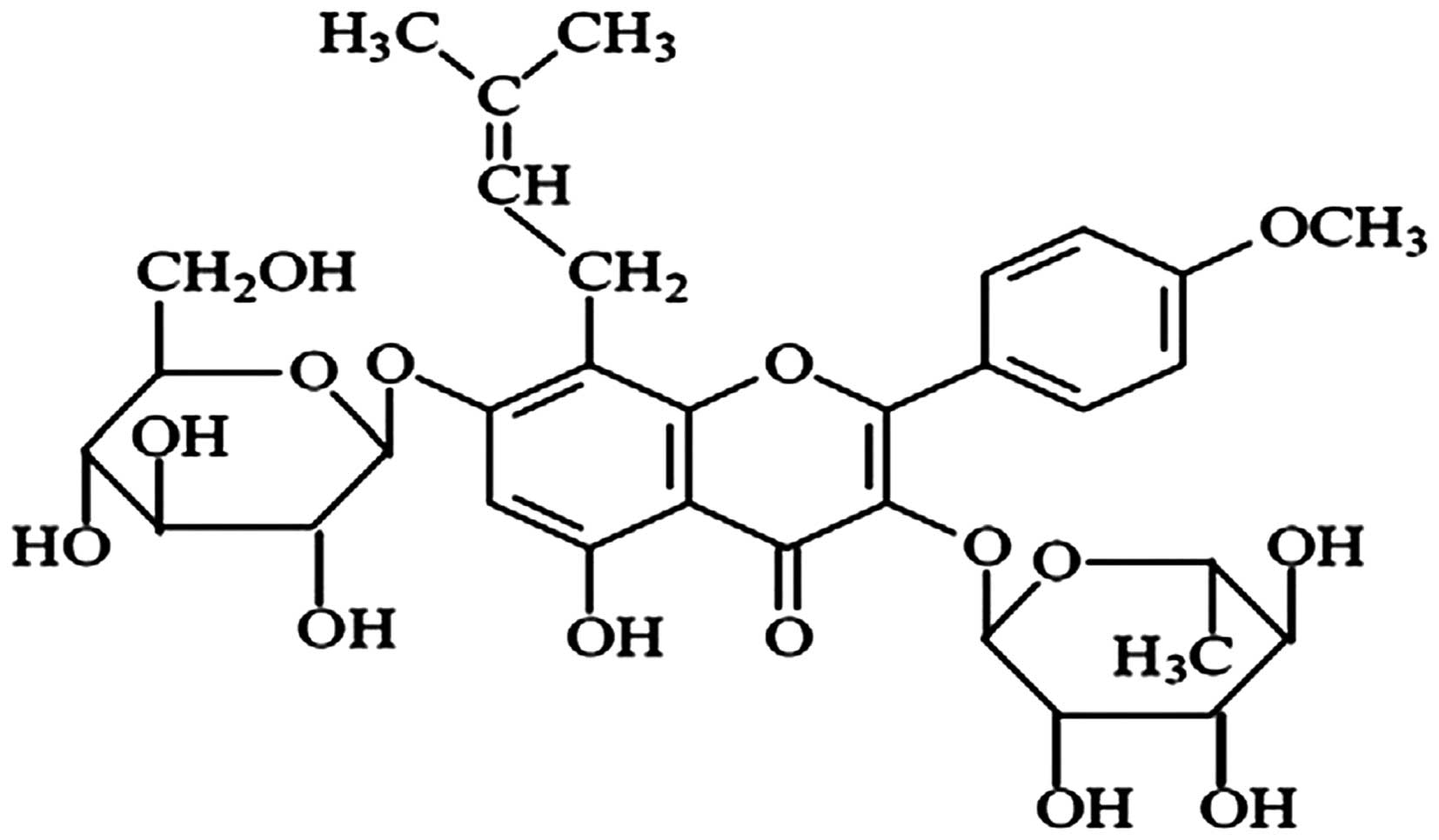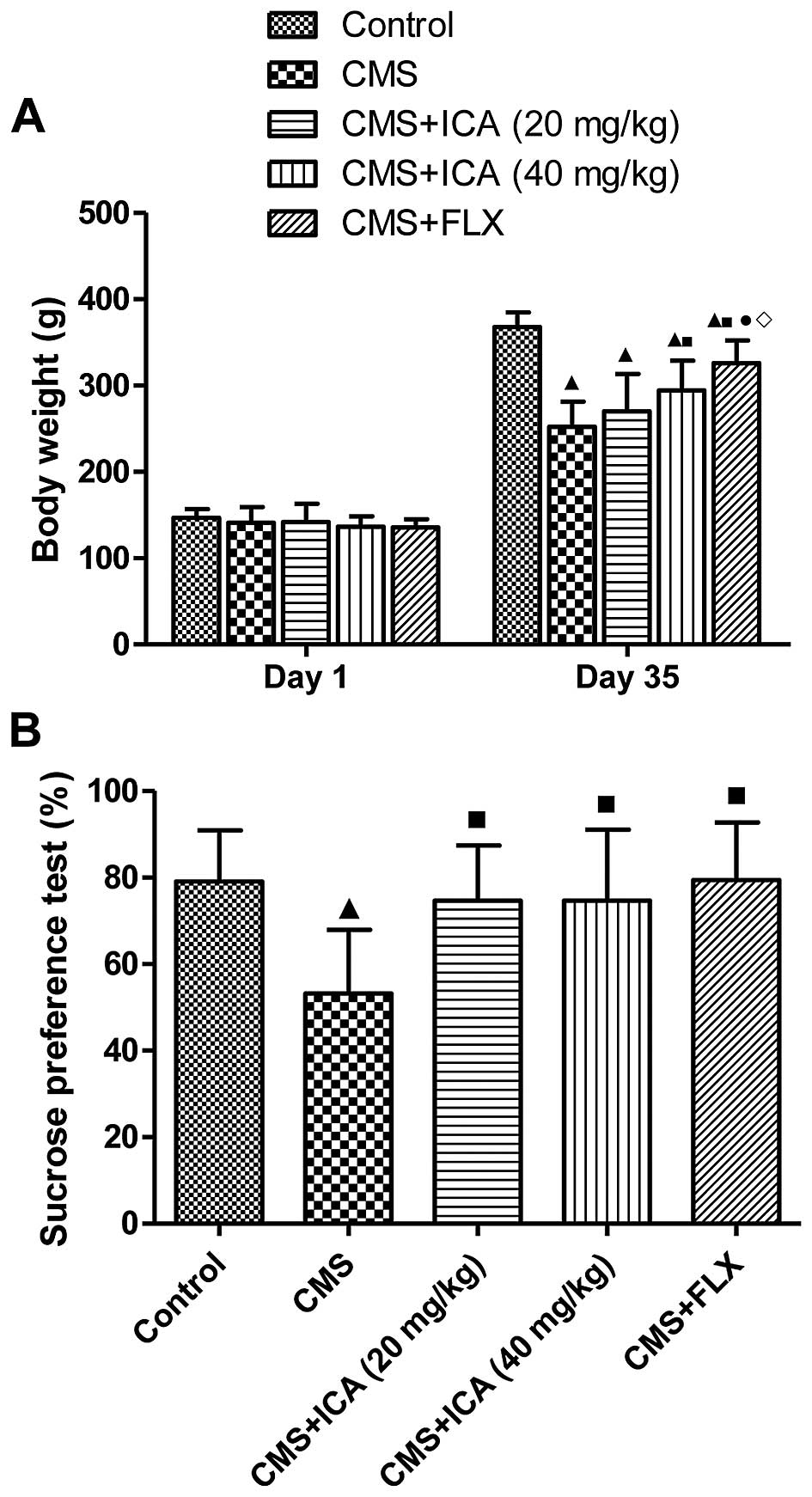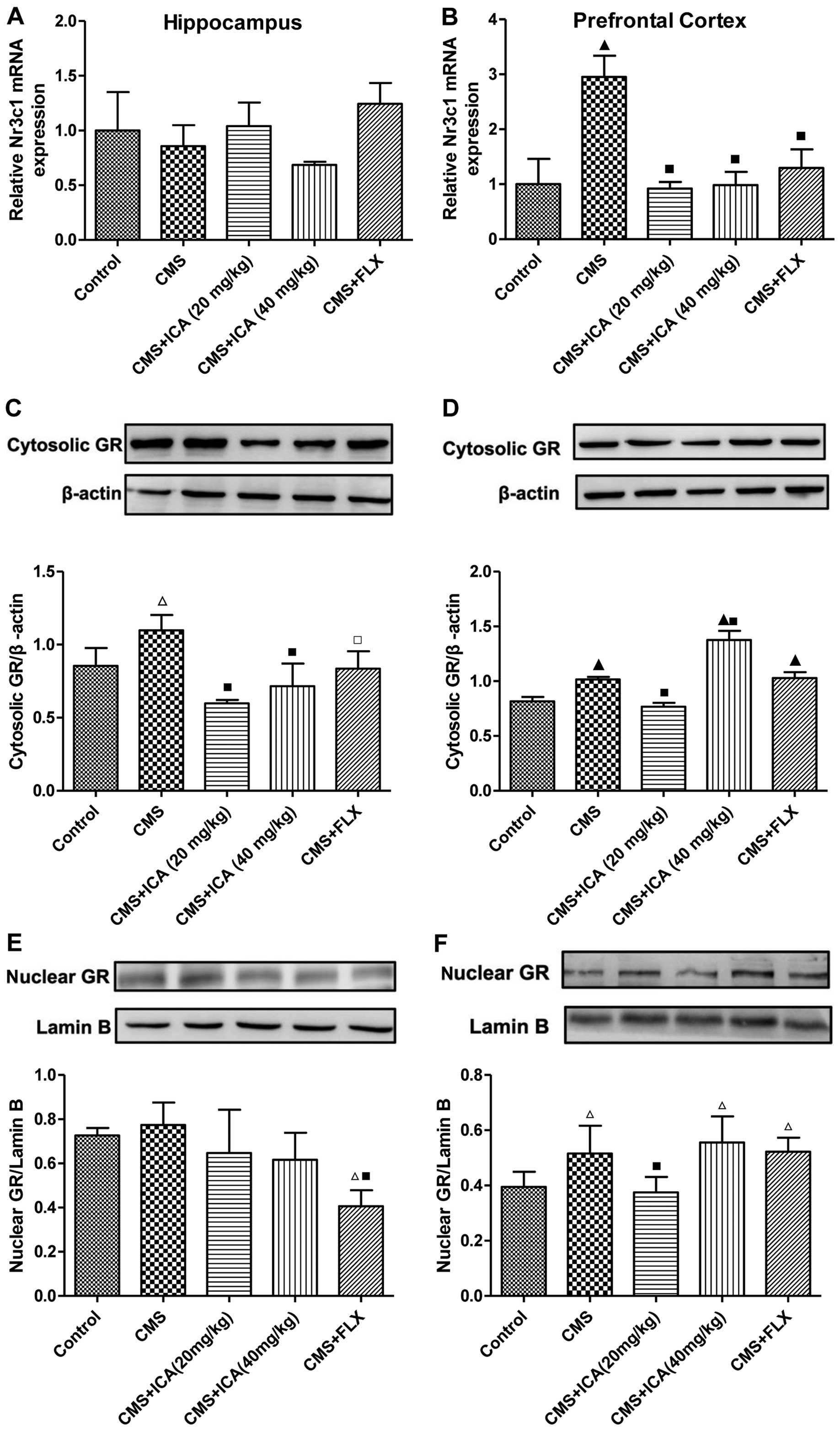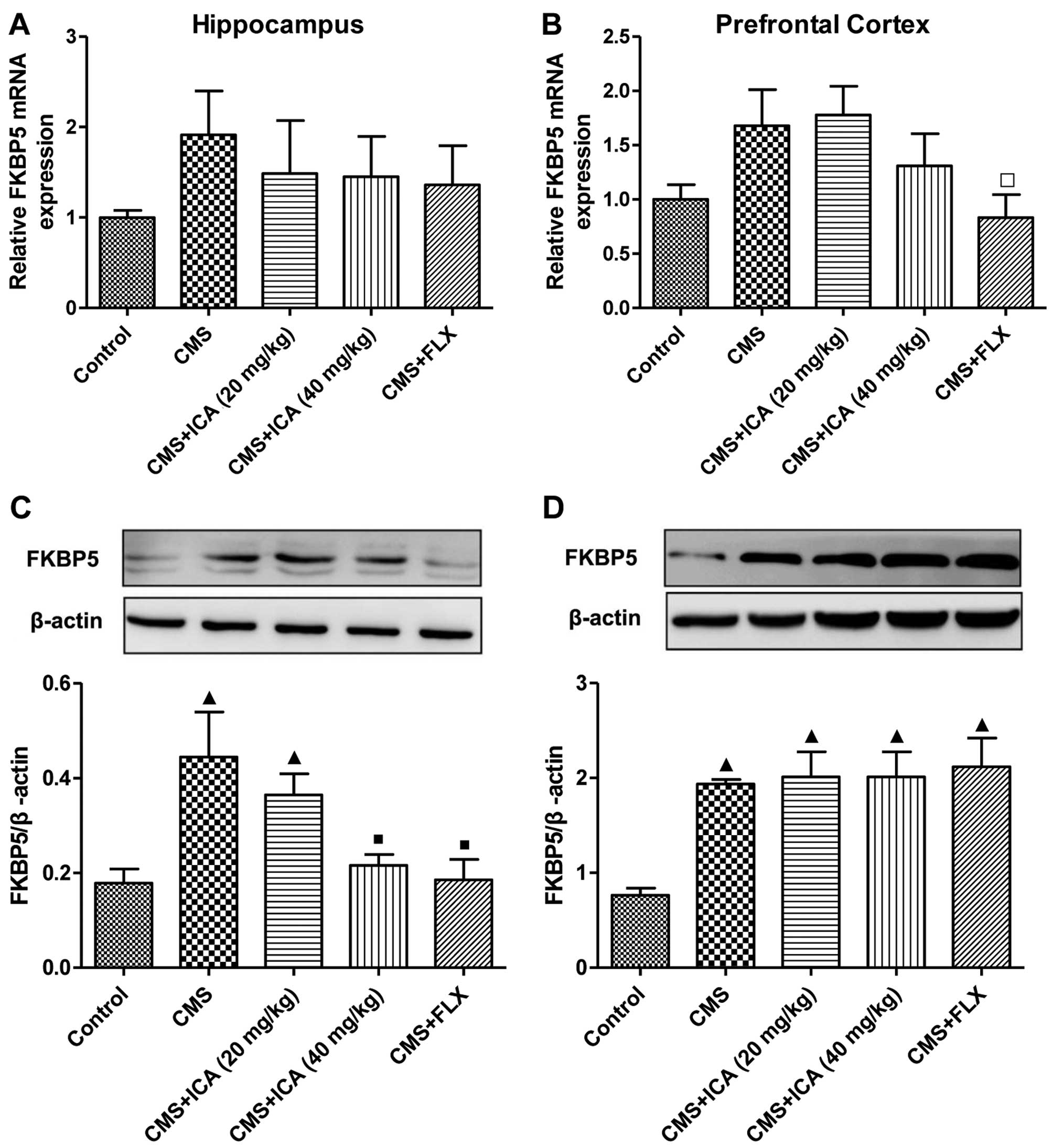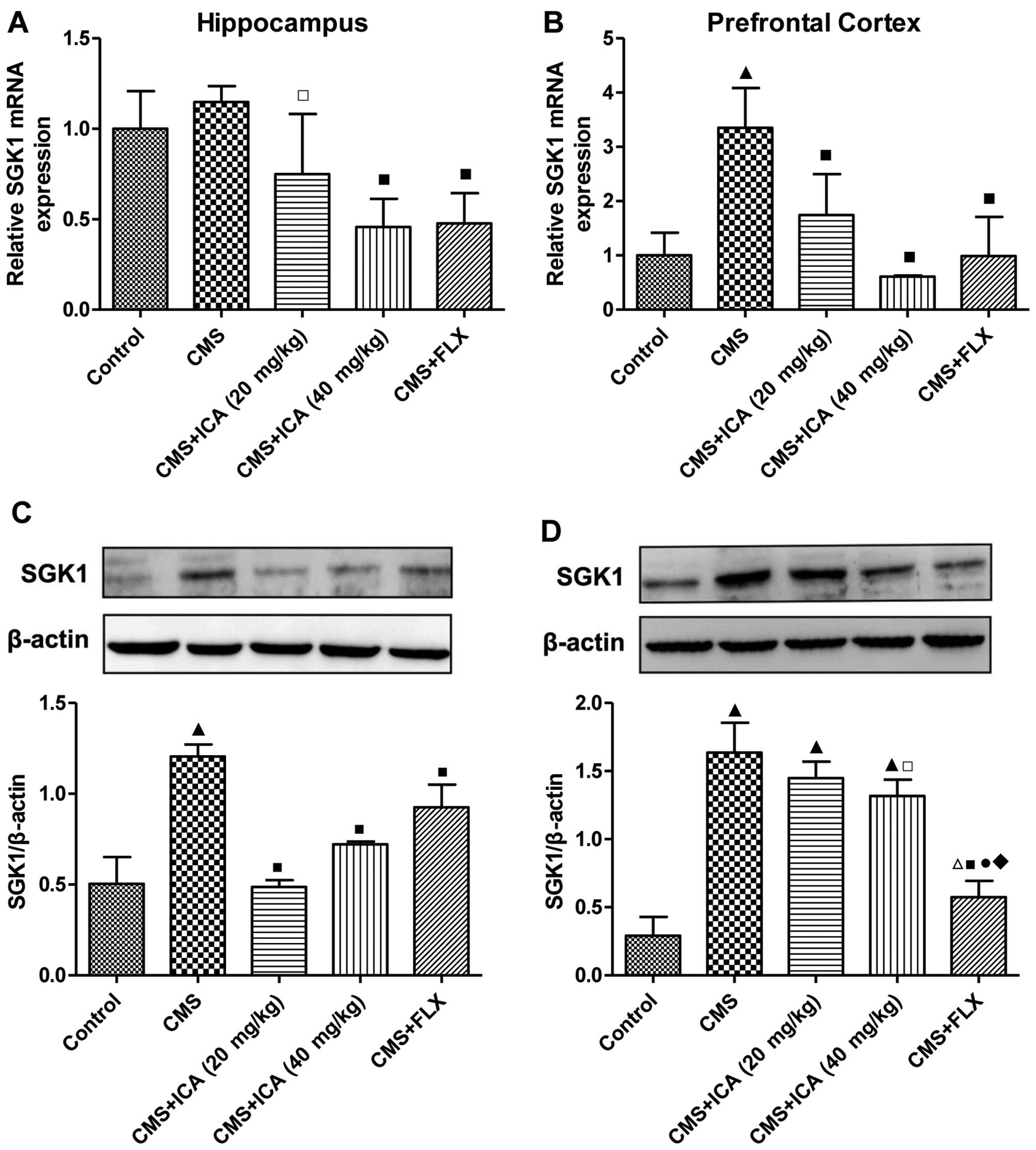|
1
|
Guidotti G, Calabrese F, Anacker C,
Racagni G, Pariante CM and Riva MA: Glucocorticoid receptor and
FKBP5 expression is altered following exposure to chronic stress:
modulation by antidepressant treatment. Neuropsychopharmacology.
38:616–627. 2013. View Article : Google Scholar :
|
|
2
|
McEwen BS, Gould EA and Sakai RR: The
vulnerability of the hippocampus to protective and destructive
effects of glucocorticoids in relation to stress. Br J Psychiatry
Suppl. 15:18–23. 1992.PubMed/NCBI
|
|
3
|
Tatro ET, Everall IP, Kaul M and Achim CL:
Modulation of glucocorticoid receptor nuclear translocation in
neurons by immunophilins FKBP51 and FKBP52: implications for major
depressive disorder. Brain Res. 1286:1–12. 2009. View Article : Google Scholar : PubMed/NCBI
|
|
4
|
Adzic M, Djordjevic J, Djordjevic A,
Niciforovic A, Demonacos C, Radojcic M and Krstic-Demonacos M:
Acute or chronic stress induce cell compartment-specific
phosphorylation of glucocor-ticoid receptor and alter its
transcriptional activity in Wistar rat brain. J Endocrinol.
202:87–97. 2009. View Article : Google Scholar : PubMed/NCBI
|
|
5
|
Sapolsky RM, Romero LM and Munck AU: How
do glucocorticoids influence stress responses? Integrating
permissive, suppressive, stimulatory, and preparative actions.
Endocr Rev. 21:55–89. 2000.PubMed/NCBI
|
|
6
|
Pariante CM: Risk factors for development
of depression and psychosis. Glucocorticoid receptors and pituitary
implications for treatment with antidepressant and glucocorticoids.
Ann NY Acad Sci. 1179:144–152. 2009. View Article : Google Scholar : PubMed/NCBI
|
|
7
|
Binder EB: The role of FKBP5, a
co-chaperone of the glucocorticoid receptor in the pathogenesis and
therapy of affective and anxiety disorders.
Psychoneuroendocrinology. 34(Suppl 1): S186–S195. 2009. View Article : Google Scholar : PubMed/NCBI
|
|
8
|
Wochnik GM, Rüegg J, Abel GA, Schmidt U,
Holsboer F and Rein T: FK506-binding proteins 51 and 52
differentially regulate dynein interaction and nuclear
translocation of the glucocorticoid receptor in mammalian cells. J
Biol Chem. 280:4609–4616. 2005. View Article : Google Scholar
|
|
9
|
Miyata S, Koyama Y, Takemoto K, Yoshikawa
K, Ishikawa T, Taniguchi M, Inoue K, Aoki M, Hori O, Katayama T and
Tohyama M: Plasma corticosterone activates SGK1 and induces
morphological changes in oligodendrocytes in corpus callosum. PLoS
One. 6:e198592011. View Article : Google Scholar : PubMed/NCBI
|
|
10
|
Lang F, Strutz-Seebohm N, Seebohm G and
Lang UE: Significance of SGK1 in the regulation of neuronal
function. J Physiol. 588:3349–3354. 2010. View Article : Google Scholar : PubMed/NCBI
|
|
11
|
Anacker C, Cattaneo A, Musaelyan K,
Zunszain PA, Horowitz M, Molteni R, Luoni A, Calabrese F, Tansey K,
Gennarelli M, et al: Role for the kinase SGK1 in stress,
depression, and glucocorticoid effects on hippocampal neurogenesis.
Proc Natl Acad Sci USA. 110:8708–8713. 2013. View Article : Google Scholar : PubMed/NCBI
|
|
12
|
Djordjevic A, Adzic M, Djordjevic J and
Radojcic MB: Stress type dependence of expression and
cytoplasmic-nuclear partitioning of glucocorticoid receptor, hsp90
and hsp70 in Wistar rat brain. Neuropsychobiology. 59:213–221.
2009. View Article : Google Scholar : PubMed/NCBI
|
|
13
|
Wu X, Wu J, Xia S, Li B and Dong J:
Icaritin opposes the development of social aversion after defeat
stress via increases of GR mRNA and BDNF mRNA in mice. Behav Brain
Res. 256:602–608. 2013. View Article : Google Scholar : PubMed/NCBI
|
|
14
|
Li B, Duan X, Xu C, Wu J, Liu B, Du Y, Luo
Q, Jin H, Gong W and Dong J: Icariin attenuates glucocorticoid
insensitivity mediated by repeated psychosocial stress on an
ovalbumin-induced murine model of asthma. Int Immunopharmacol.
19:381–390. 2014. View Article : Google Scholar : PubMed/NCBI
|
|
15
|
Liu B, Xu C, Wu X, Liu F, Du Y, Sun J, Tao
J and Dong J: Icariin exerts an antidepressant effect in an
unpredictable chronic mild stress model of depression in rats and
is associated with the regulation of hippocampal neuroinflammation.
Neuroscience. 294:193–205. 2015. View Article : Google Scholar : PubMed/NCBI
|
|
16
|
Liu B, Zhang H, Xu C, Yang G, Tao J, Huang
J, Wu J, Duan X, Cao Y and Dong J: Neuroprotective effects of
icariin on corticosterone-induced apoptosis in primary cultured rat
hippocampal neurons. Brain Res. 1375:59–67. 2011. View Article : Google Scholar
|
|
17
|
Pan Y, Wang FM, Qiang LQ, Zhang DM and
Kong LD: Icariin attenuates chronic mild stress-induced
dysregulation of the LHPA stress circuit in rats.
Psychoneuroendocrinology. 35:272–283. 2010. View Article : Google Scholar
|
|
18
|
Pan Y, Zhang WY, Xia X and Kong LD:
Effects of icariin on hypothalamic-pituitary-adrenal axis action
and cytokine levels in stressed Sprague-Dawley rats. Biol Pharm
Bull. 29:2399–2403. 2006. View Article : Google Scholar : PubMed/NCBI
|
|
19
|
Pan Y, Kong LD, Li YC, Xia X, Kung HF and
Jiang FX: Icariin from Epimedium brevicornum attenuates chronic
mild stress-induced behavioral and neuroendocrinological
alterations in male Wistar rats. Pharmacol Biochem Behav.
87:130–140. 2007. View Article : Google Scholar : PubMed/NCBI
|
|
20
|
Hill MN, Hellemans KG, Verma P, Gorzalka
BB and Weinberg J: Neurobiology of chronic mild stress: parallels
to major depression. Neurosci Biobehav Rev. 36:2085–2117. 2012.
View Article : Google Scholar : PubMed/NCBI
|
|
21
|
Calabrese F, Guidotti G, Molteni R,
Racagni G, Mancini M and Riva MA: Stress-induced changes of
hippocampal NMDA receptors: modulation by duloxetine treatment.
PLoS One. 7:e379162012. View Article : Google Scholar : PubMed/NCBI
|
|
22
|
Maccari S, Mormède P, Piazza PV, Simon H,
Angelucci L and Le Moal M: Hippocampal type I and type II
corticosteroid receptors are modulated by central noradrenergic
systems. Psychoneuroendocrinology. 17:103–112. 1992. View Article : Google Scholar : PubMed/NCBI
|
|
23
|
Pavlides C, Watanabe Y, Magariños AM and
McEwen BS: Opposing roles of type I and type II adrenal steroid
receptors in hippocampal long-term potentiation. Neuroscience.
68:387–394. 1995. View Article : Google Scholar : PubMed/NCBI
|
|
24
|
Webster MJ, Knable MB, O'Grady J, Orthmann
J and Weickert CS: Regional specificity of brain glucocorticoid
receptor mRNA alterations in subjects with schizophrenia and mood
disorders. Mol Psychiatry. 7:985–994. 9242002. View Article : Google Scholar : PubMed/NCBI
|
|
25
|
Zheng H, Liu Y, Li W, Yang B, Chen D, Wang
X, Jiang Z, Wang H, Wang Z, Cornelisson G and Halberg F: Beneficial
effects of exercise and its molecular mechanisms on depression in
rats. Behav Brain Res. 168:47–55. 2006. View Article : Google Scholar
|
|
26
|
Li M, Fu Q, Li Y, Li S, Xue J and Ma S:
Emodin opposes chronic unpredictable mild stress induced
depressive-like behavior in mice by upregulating the levels of
hippocampal glucocorticoid receptor and brain-derived neurotrophic
factor. Fitoterapia. 98:1–10. 2014. View Article : Google Scholar : PubMed/NCBI
|
|
27
|
Skupio U, Tertil M, Sikora M, Golda S,
Wawrzczak-Bargiela A and Przewlocki R: Behavioral and molecular
alterations in mice resulting from chronic treatment with
dexamethasone: relevance to depression. Neuroscience. 286:141–150.
2015. View Article : Google Scholar
|
|
28
|
Moutsatsou P, Psarra AM, Tsiapara A,
Paraskevakou H, Davaris P and Sekeris CE: Localization of the
glucocorticoid receptor in rat brain mitochondria. Arch Biochem
Biophys. 386:69–78. 2001. View Article : Google Scholar : PubMed/NCBI
|
|
29
|
Du J, Wang Y, Hunter R, Wei Y, Blumenthal
R, Falke C, Khairova R, Zhou R, Yuan P, Machado-Vieira R, et al:
Dynamic regulation of mitochondrial function by glucocorticoids.
Proc Natl Acad Sci USA. 106:3543–3548. 2009. View Article : Google Scholar : PubMed/NCBI
|
|
30
|
Xing Y, He J, Hou J, Lin F, Tian J and
Kurihara H: Gender differences in CMS and the effects of
antidepressant venlafaxine in rats. Neurochem Int. 63:570–575.
2013. View Article : Google Scholar : PubMed/NCBI
|
|
31
|
Xing Y, Hou J, Meng Q, Yang M, Kurihara H
and Tian J: Novel antidepressant candidate RO-05 modulated
glucocorticoid receptors activation and FKBP5 expression in chronic
mild stress model in rats. Neuroscience. 290:255–265. 2015.
View Article : Google Scholar : PubMed/NCBI
|
|
32
|
Webster MK, Goya L, Ge Y, Maiyar AC and
Firestone GL: Characterization of sgk, a novel member of the
serine/threonine protein kinase gene family which is
transcriptionally induced by glucocorticoids and serum. Mol Cell
Biol. 13:2031–2040. 1993. View Article : Google Scholar : PubMed/NCBI
|
|
33
|
Cai C, Thorne J and Grabel L: Hedgehog
serves as a mitogen and survival factor during embryonic stem cell
neurogenesis. Stem Cells. 26:1097–1108. 2008. View Article : Google Scholar : PubMed/NCBI
|
|
34
|
Feng Z, Liu L, Zhang C, Zheng T, Wang J,
Lin M, Zhao Y, Wang X, Levine AJ and Hu W: Chronic restraint stress
attenuates p53 function and promotes tumorigenesis. Proc Natl Acad
Sci USA. 109:7013–7018. 2012. View Article : Google Scholar : PubMed/NCBI
|















